What are the potential benefits and pitfalls of gaming?
Just like social media, online games can potentially have their fair share of benefits. For example, they can help to develop your child’s teamwork, concentration, communication, and even problem-solving skills.
Gaming can also be an opportunity for them to practise communication and conflict resolution skills. Through games that require higher-order thinking and persistence, your child can also pick up skills of adaptability, co-operation, and strategising.

Along with these benefits, however, there are also pitfalls associated with gaming. For example, excessive online gaming may lead to cyberbullying, attracting unwanted attention online, excessive in-app purchases, and even increased levels of anxiety due to the competitive nature of the game. As a parent, it is important to be aware of these potential dangers and risks so you can guide your child.
To better communicate with your child when guiding them, it may be useful for you to understand why your child likes to play games. For example, they may be playing games to receive a mix of intrinsic (e.g. feeling good about their abilities and effort), and extrinsic rewards (e.g. game coins/points) when they succeed. By taking time to understand how they feel, you can build positive and healthier relationships with them.
To learn more about the potential benefits and risks of online gaming so you can make informed decisions for your child, click here.
What should you do if your child is addicted to gaming?
If you notice your child spending many hours playing games and becoming irritable or annoyed when asked to stop, it may be a sign of excessive gaming. This may increase your child’s risk of developing Internet Gaming Disorder.
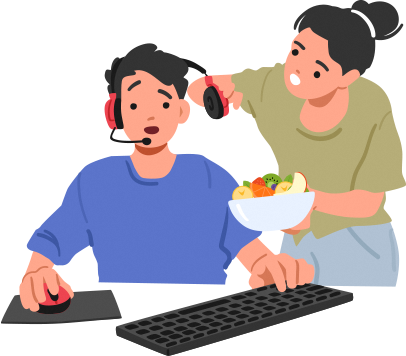
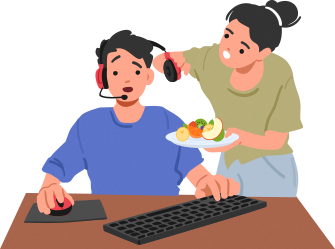
If you are worried about how much time your child spends gaming, talk to them about it. Work together to formulate a plan to balance their gaming with other screen-free activities and check in regularly with them to review this plan.
You can also have conversations with them to find out more about the games they play and get them to reflect on their gaming habits.
For example:
If you notice your child has been playing a particular game on their device a lot recently, you can say:

To get your child to think about the benefits and risks of gaming, you can say:
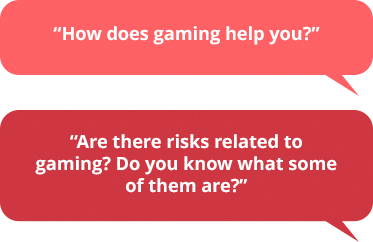
“Aside from chatting with your classmates when gaming, are there others whom you chat with?”
(In this conversation, you may want to find out more on protecting your child from unwanted attention online.)

If you find out that your child has shared personal information with strangers even though the agreement was not to do so, you can say:

If you find out that your child has spent money on games, you can say:

To help them manage their gaming, you can involve your child in writing out a set of rules and expectations on when they are allowed to play games on their devices, for how long, and the consequences for not following the agreed upon rules.
For example, you can say:
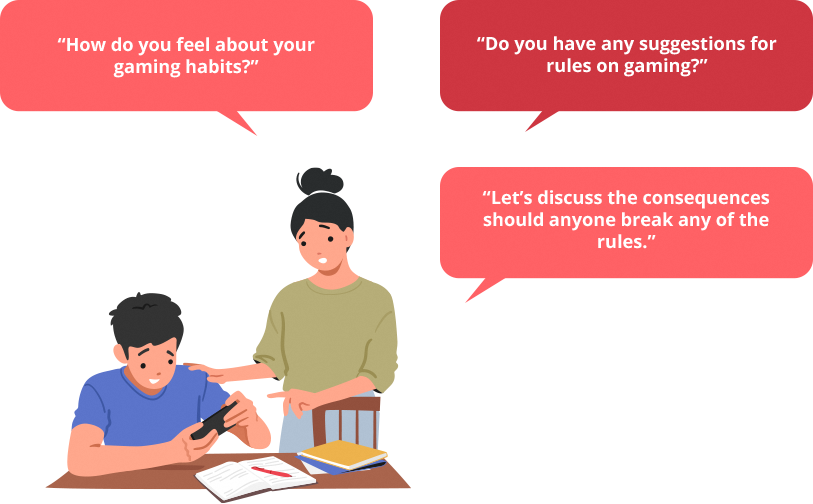
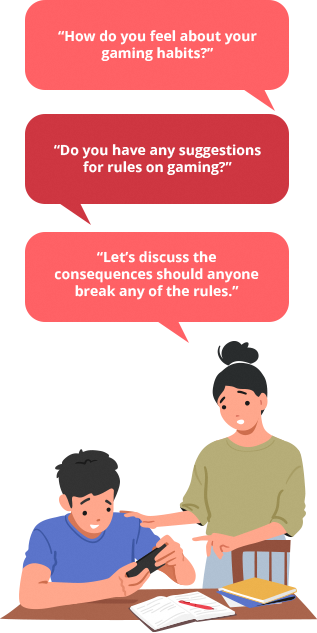
If you find that there has been no improvement and your child’s gaming habits continue to be a cause of concern, you can seek further support from their school or other community partners such as Help123 by TOUCH Community Services or Singapore’s One-Stop Cyber Wellness Hotline at 1800 6123 123*.
If your child’s gaming habits cause significant deterioration and impairment to their quality of life (e.g. affecting their sleep, appetite, ability to go to school), you can consider seeking professional help. These professionals can help assess the severity of the problem and recommend appropriate interventions. To reach out, call the National Addictions Management Service (NAMS) All Addictions helpline at 6-7326837 (6-RECOVER).
*Airtime charges apply for mobile calls to 1800 service lines.


